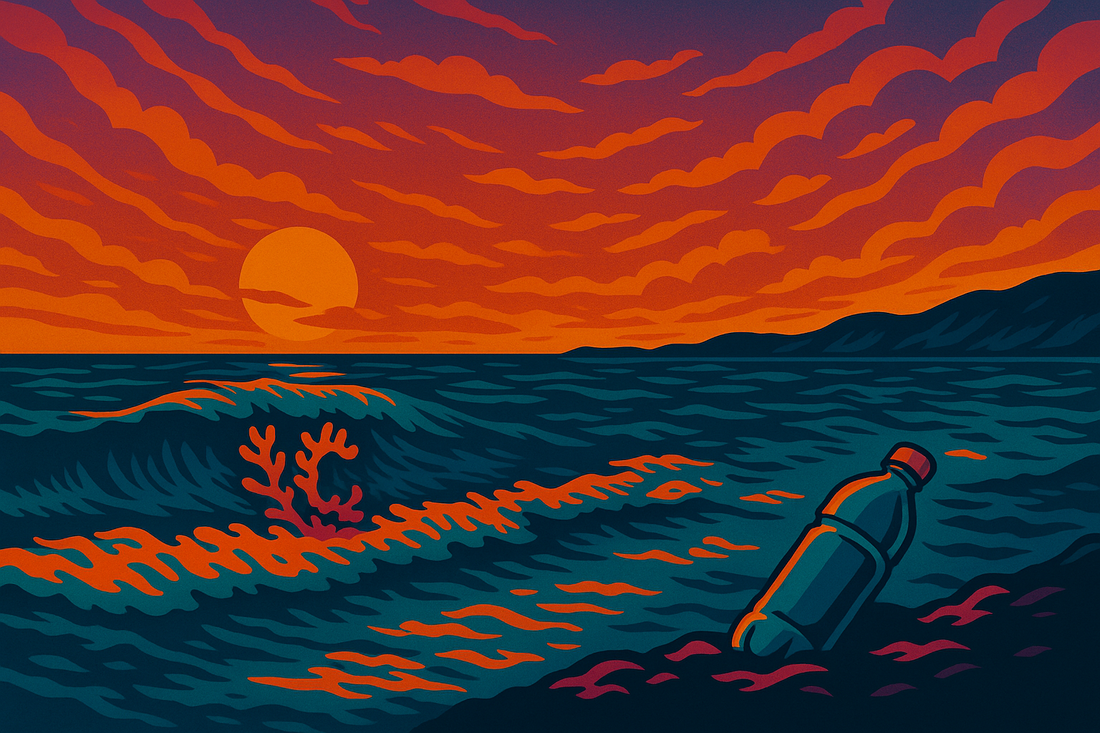
Business as (Un)Usual: 3 Brands Turning the Tide on Ocean Pollution
“If corporations helped create the plastic problem, they better start being part of the solution.”
— Immoral Coral
The Waste We Don’t See
Every year, over 11 million metric tons of plastic flood into the ocean—much of it traced directly back to corporate supply chains. From shrink-wrapped shipping pallets to single-use hotel toiletries, the business world runs on convenience. And that convenience is choking the sea.
Fast fashion dumps microplastics into the water every time someone does laundry. Food and beverage companies continue to pump out non-recyclable packaging at a global scale. And hotels? For decades, they’ve operated with a near-invisible trail of waste: tiny shampoo bottles, plastic cutlery, packaging foam, cling wrap, vending machines full of unrecyclables.
The result? Coral reefs are suffocating. Sea turtles are swallowing straws. And brands are losing the trust of a generation that actually cares what happens beyond the boardroom.
But a few companies are starting to break the mold. And whether it’s reducing plastics, reimagining products, or rebuilding supply chains, these standout businesses are proving that sustainability isn’t just good ethics—it’s good business.
Best Western: Breaking Up With Single-Use
Hotels are infamous for their waste. But Best Western is setting a new standard by ditching single-use plastics across thousands of properties.
The company began rolling out bulk dispensers for shampoo, conditioner, and body wash—phasing out those tiny, throwaway bottles that rarely get recycled. Many locations have also replaced plastic cutlery and stirrers with compostable options, and are moving toward plastic-free check-in amenities.
It’s more than a nod to eco-trends—it’s a logistical shift. By removing millions of miniature plastic items from circulation, Best Western is directly reducing the chances that those items end up in landfills, rivers, or reefs.
While critics once claimed guests expected individually wrapped everything, the modern traveler sees sustainability as part of the experience. Best Western listened. And the ocean thanks them for it.
Adidas: Rewriting Performance With Plastic
Adidas took a bold step when it launched its Parley for the Oceans line—a collaboration that transforms intercepted marine plastic into high-performance athletic wear.
The idea? Take plastic waste from beaches and coastal communities, shred it, reprocess it, and spin it into threads for sneakers and sportswear. Since the project’s launch, Adidas has produced millions of pairs of shoes made with Parley Ocean Plastic™, drastically reducing the need for virgin materials.
Even more impressively, the brand pledged to eliminate virgin polyester in all products by 2024. That means future Adidas gear won’t just look good—it won’t be polluting your local reef every time you wash it.
By turning waste into wear, Adidas proves that innovation and impact don’t have to be opposites. In fact, they make a darn good team.
The graphic above breaks down the full transformation of marine plastic into performance gear. From collection in coastal regions like the Maldives to its rebirth as Parley Ocean Plastic™ yarn, each Adidas x Parley product is a small act of ocean rescue—proof that trash doesn’t have to stay trash. It just needs purpose.
Grove Collaborative: Plastic-Free by Design
Grove Collaborative, a home and personal care company, is tackling plastic pollution where it starts—at the product level.
Their promise? To be 100% plastic-free by 2025. That’s not just in packaging—it’s across their entire product lineup. From reusable glass soap dispensers to refillable cleaning concentrates, Grove rethinks the way products are made, used, and refilled.
They also launched the Beyond Plastic™ initiative, challenging other companies to join their mission. So far, they’ve diverted millions of pounds of plastic from entering the waste stream, and they’re just getting started.
While big-box brands scramble to greenwash their image, Grove is rebuilding the system from scratch—one aluminum canister and compostable pod at a time.
The Bottom Line: Do Better or Get Left Behind
The ocean doesn’t care about corporate statements. It cares about action.
Best Western swapped tiny plastics for long-term change.
Adidas made trash wearable—and stylish.
Grove Collaborative redesigned the entire cleaning aisle.
Each of these brands took a different route, but they all share one thing: a refusal to keep doing business as usual. And while it won’t undo the damage alone, it sets a precedent. Because if a sneaker brand, a hotel chain, and a soap company can change their ways… what excuse does anyone else have?
At Immoral Coral, we believe in holding corporations accountable—but we also believe in spotlighting those who get it right. Change doesn’t have to be perfect. It just has to start.
And if your business isn’t helping the ocean, it might be part of the problem.
